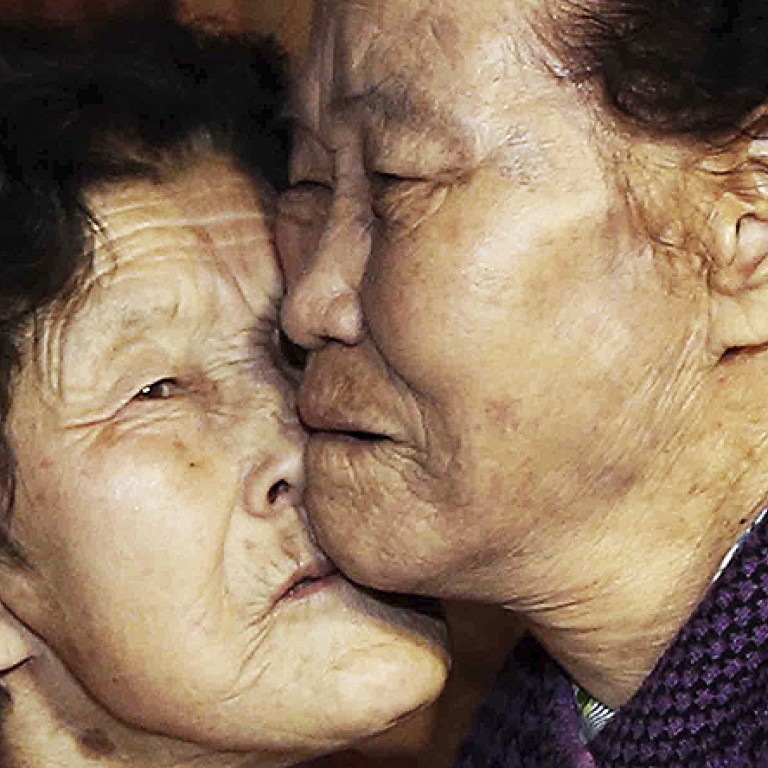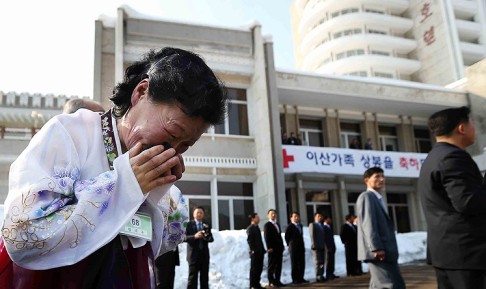
Update | Separated Korean families hold tearful final farewells as reunions come to an end
There were poignant scenes at the North Korean resort of Mount Kumgang as families split by the partition of the country in 1953 ended reunions with tears and hopes for the future
The joy of being reunited for the first time in decades turned to grief for North and South Korean families on Saturday as a rare cross-border visit ended, with participants unlikely to ever see their relatives again.
In perhaps the most traumatic moment of the emotionally-charged event, 80 elderly South Koreans and their 174 Northern relatives were separated, many at first refusing to let go of their loved ones’ hands.
The families, the first of two batches who are being allowed to meet with each other 60 years after they were torn apart by the chaos of the 1950-1953 Korean War, were given an hour to say goodbye in a hotel dining room at a North Korean mountain resort.
At the start of Saturday’s meeting, many were already in tears, while others forced smiles to hide pent-up emotions.

As the time for parting ways drew near, the atmosphere became more heated, punctuated by bursts of crying.
After boarding their coaches, the departing South Koreans waved through closed windows at the loved ones they were leaving behind in the North, displaying written messages and forming their hands into the shapes of hearts.
“I’ve been trying hard not to cry. Thank you for allowing me to see you alive and well. Stay healthy,” South Korean Lee Myeong-ho, 82, told his 77-year-old brother Lee Chol-ho from the North, clutching his hands tightly.

“We’ll be able to meet again if you remain healthy,” Yang-gon said.
“We will meet again when reunification comes. Have faith in it,” his brother Yang-soo replied.
The families had spent a total of 11 hours on six occasions together since Thursday, including mass meetings over meals and a private reunion without media TV cameras.

Tens of millions of people were displaced by the sweep of the Korean War, which saw the frontline swing from the south of the peninsula to the northern border with China and back again.
The chaos and devastation separated brothers and sisters, parents and children, husbands and wives.
Because the conflict concluded with an armistice rather than a peace treaty, the two Koreas technically remain at war.
This week’s reunions, the first of their kind in three years, are widely being seen as a possible first step towards thawing cross-border ties.
Held at Mount Kumgang resort in North Korea near the heavily fortified inter-Korean border, they were only secured after intense negotiations.

In an apparent goodwill gesture, Seoul on Friday approved the shipment by two private aid groups for close to US$1 million worth of tuberculosis medicine and powdered milk to North Korea.
But North Korea’s chief delegate to the reunion event, Ri Chong-bok, on Saturday issued a veiled threat to the South over the joint drills.
“As long as accusations, slandering, military exercises and other hostile activities against us continue, the future path of North-South ties would be unpredictable,” he told Chosun Sinbo, a pro-Pyongyang newspaper published in Japan.

No further reunions are scheduled.
The reunions programme began in earnest after a historic North-South summit in 2000, but the numbers clamouring for a chance to participate have always far outstripped those actually selected.
For many people, time simply ran out. Last year alone, 3,800 elderly South Koreans who had applied for reunions passed away.
